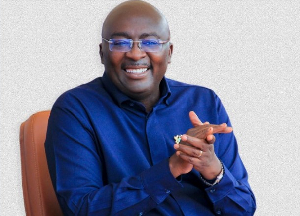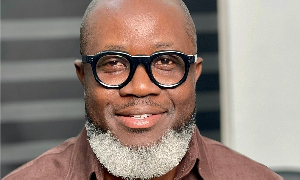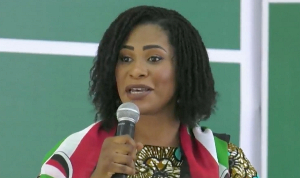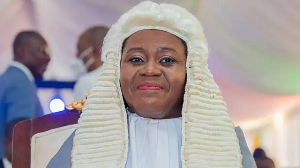As a people, we should make every effort to look ahead, march on, and never look back, because the past is full of melancholy, rancour, and bitterness, as bitter as being kept in darkness for well over four years.
My dear reader, while it is true that Mahama has had the opportunity to steer the country in the right direction as president but abysmally failed to do so, Bawumia has never been president before, a fact acknowledged by Mahama in 2016.
If you may remember, prior to the 2016 general elections, former President Mahama openly admonished the then-NPP running mate, Dr. Mahamudu Bawumia, to cease criticising him (Mahama) because he (Bawumia) had never been president before (emphasis mine).
Mahama indeed stated the obvious: Bawumia has never been president before; he is the vice president.
But as a vice president, Bawumia dutifully assisted Akufo-Addo with the implementation of numerous and well-received policies and programmes, including the Free SHS.
What is more gratifying, though, is that before the insidious and ecumenically diffused Coronavirus and the Ukraine-Russia intractable conflict, Bawumia admirably assisted Akufo-Addo in overturning the economic mess left by the Mahama administration.
Indeed, before the deadly coronavirus, Bawumia ably assisted Akufo-Addo and raised Ghana’s economic growth from 3.4% to 8.6%.
Truly, it was Bawumia who admirably assisted Akufo-Addo and, within a short space of time, reversed the inflation from 15.4% to 7.5%.
Unsurprisingly, prior to the 2020 general elections, the reputable Economist Intelligence Unit (EIU) reported that the governing New Patriotic Party (NPP) was going to retain power (see:‘2020 election is yours to lose-EIU predicts NPP victory’; myjoyonline.com/ghanaweb.com, 15/09/2019).
The Economist Intelligence Unit (EIU) report concluded that former President John Dramani Mahama was going to find it extremely difficult to convince discerning Ghanaians to accept that he is the preferable manager of Ghana’s economy, given the country’s fairly strong economic growth under the Akufo-Addo/Bawumia administration before the pernicious coronavirus.
Ghana’s economy received thumbs-up from the likes of the then Director of the International Monetary Fund (IMF), Ms. Christine Lagarde, the United Nations Special Rapporteur on extreme poverty and human rights, Philip Alston, and other reputable international organisations, who had earlier commended the Akufo-
Addo/Bawumia administration on its excellent economic performance in the two and a half years in office.
In 2017, Bloomberg News, for example, predicted Ghana to become “Africa’s fastest-growing economy in 2018, “and Ghana was proclaimed “Star of Africa in 2018 Lenders’ Economic Forecasts.”
In reporting on the same fiscal policy achievements, Le Monde pointed out that “Ghana’s economic success is not just the result of an oil-driven boom but is also due to prudent economic management, an entrepreneurial population, the role of traditional leaders, and good governance.”
The then Director of the International Monetary Fund (IMF), Ms. Christine Lagarde, observed that the Ghanaian economy, before the insidious coronavirus, was in a better place than it was in the previous years under the John Dramani Mahama administration.
Ms. Lagarde opined that the Akufo-Addo/Bawumia administration made important gains towards macroeconomic stability, including inflation, which declined to a single digit and fell within the Bank of Ghana’s (BoG’s) tolerance band; buoyant growth, averaging about five percent in 2018 and over six percent in 2017–18; and a primary surplus in 2017 for the first time in 15 years (IMF 2018).
The Special Rapporteur on extreme poverty and human rights, Philip Alston, observed: “Ghana met the targets for halving extreme poverty and halving the proportion of people without access to safe drinking water, and it achieved the goals relating to universal primary education and gender parity in primary school.
The ace journalist, Kweku Baako, hit the nail on the head when he pointed out on Joy FM’s political show (News File) on Saturday, April 6, 2019, that the NPP administration led by President Akufo-Addo has performed exceedingly better than the erstwhile NDC government led by former President Mahama.
Aptly comparing the state of the economy in the first two years of the two administrations, Kweku Baako poignantly concluded that the economy is in better shape under the Akufo-Addo/Bawumia administration than it was under the Mahama administration.
Baako, therefore, asserted poignantly: “There’s no doubt that the Akufo-Addo/Bawumia administration has done far better than the Mahama administration; it’s as simple as that; the figures and the records support it (myjoyonline.com, 6/04/2019).”
Sometime in 2019, a video clip went viral, purported to be that of a forum organised by the leadership of the opposition NDC, showing a guest speaker, a Nigerian scholar, candidly commending the Akufo-Addo/Bawumia administration on Ghana’s favourable economic growth before the deadly coronavirus, obviously to the utter chagrin of his hosts (the NDC Executives), many of whom were befuddled by the guest speaker’s unbelievable intellectual honesty.
The overarching question then is: Did the NDC loyalists really trust the judgment of the said knowledgeable and largely credible Nigerian academic?
Well, I am pretty sure they did; otherwise, they would not have invited him to speak on Ghana’s economy at their special gathering.
Interestingly, preceding the honest and erudite Nigerian’s endorsement of Ghana’s well-publicized propitious economic growth were praises from some credible international organisations and influential people, both at home and abroad.
But despite the reputable organisations and other prominent people’s positive remarks on Ghana’s economy back then, the naysayers were never inspired. But were we really surprised? No, after all, hasn’t it been written: ‘No prophet is accepted in his homeland’?
Back then, I humbly questioned the judgment of those who were proclaiming
somewhat spuriously that Ghana’s economy under former President Mahama (3.4% growth and 15.4% inflation) was better than the Akufo-Addo/Bawumia record before the insidious coronavirus (8.6% growth and 7.5% inflation).
Opinions of Friday, 24 May 2024
Columnist: Kwaku Badu















